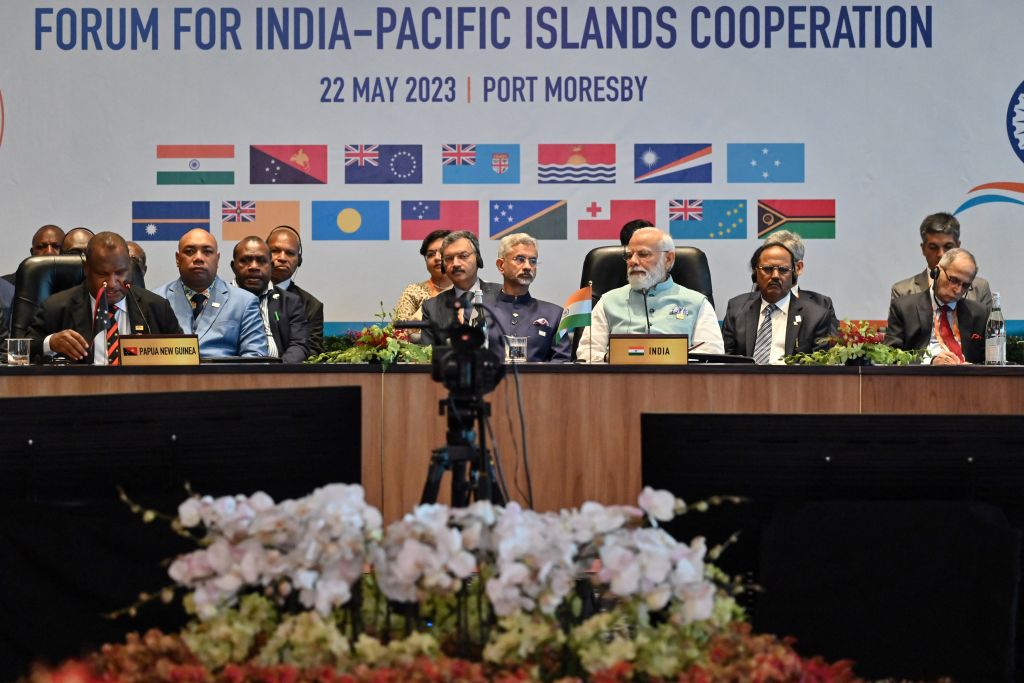Modi in Papua New Guinea: leader of the global south or Quad partner?

The video of Indian Prime Minister Narendra Modi and Papua New Guinean Prime Minister James Marape warmly embracing, followed by Marape attempting to touch Modi’s feet—a demonstration of respect in Indian culture—was a reminder that India is seen differently to many other partners in the Pacific islands.
And Marape made that clear in his comments to Modi, referring to PNG’s and India’s ‘shared … history of being colonised by colonial masters’. Marape welcomed Modi as ‘the leader of the global south’ and asked him ‘to offer a third big voice in the face of the global north’, saying that Pacific island countries ‘will rally behind your leadership at global forums’. These sentiments picked up on ideas discussed at the Voice of Global South Summit of developing countries that India had convened in January.
To some degree, the tone of Marape’s comments can be attributed to the effusive nature of the diplomatic language used during state visits. But they also highlighted that, as a fellow formerly colonised and developing country, India brings a unique perspective to its engagement in the Pacific islands region that may be appreciated by Pacific leaders. Having just concluded controversial negotiations on a defence cooperation agreement with the United States, Marape may have been especially aware of this.
Marape’s comments also echoed language used around the creation of the Non-Aligned Movement. During the Cold War, India, PNG and other—primarily developing and decolonised—countries, recognised the benefits of not formally aligning with either of the superpowers. Similar dynamics are evident today. Even without formal alignment, a country can enter into issue-based partnerships to fulfil its foreign policy goals and ambitions, or its economic development and infrastructure targets. This reflects India’s current approach—entering into the Quad with like-minded countries, for instance, but keeping its ‘strategic autonomy’ intact.
While not all Pacific leaders may share Marape’s enthusiasm for rallying behind a third voice in international affairs, the view that Pacific island countries should be ‘friends to all’ is common. Several Pacific leaders have recognised that not choosing sides in the current strategic competition empowers them to use ‘tactical, shrewd and calculating approaches’ to exploit that competition to access aid, concessional loans, military assistance and international influence. This echoes India’s approach to pursuing its interests, even when they differ from those of its partners (an example would be the ongoing Russia–Ukraine war).
While in PNG, Modi convened the third summit of the Forum for India–Pacific Islands Cooperation. He had initiated the first summit in 2014 when he travelled to Fiji, which represented a watershed in India’s outreach to the Pacific islands region. Before then, India had primarily been occupied with the Indian Ocean region and its extended neighbourhood, Southeast Asia. During the third summit in Port Moresby, Modi outlined a range of possible areas of collaboration, including suggesting that Pacific island countries join the Coalition for Disaster Resilient Infrastructure.
The different way India may be perceived in the Pacific raises questions about whether and how it will cooperate with established regional partners, such as Australia, the US, Japan, France and New Zealand.
Notably, Modi’s visit to PNG has sidelined those partners from India’s direct engagement with Pacific leaders. The Port Moresby summit excluded Australia, New Zealand and the French territories of New Caledonia and French Polynesia, even though all are members of the Pacific Islands Forum (PIF), the region’s premier multilateral institution.
PIF leaders, most recently in their 2050 strategy for the Blue Pacific continent, have emphasised the importance of the PIF’s centrality and regional solidarity. The exclusion of four of its members from the PNG summit raises questions about India’s commitment to those principles. Notably, when Japan holds its regular meeting with Pacific islands leaders, all 18 PIF members are invited. South Korea is holding its inaugural Korea–Pacific Islands Summit in May and is also inviting all PIF members.
India’s decision not to include all members of the PIF in the PNG summit also seems to contradict the recent Quad leaders’ joint statement, which expressed ‘respect for the leadership of regional institutions, including … the Pacific Islands Forum’. Indeed, while Australia has sought to work with India as Australia has tried to increase its presence in the Indian Ocean region, the guestlist for the PNG summit raises questions about how willing India will be to work with its Quad colleagues, and other established partners, in the Pacific islands region.
And if India does seek to work more closely with its Quad and other partners in the Pacific, it will need to reconcile this with its perceived role as a leader of the global south. Marape’s comments indicate that at least one Pacific leader welcomes India’s presence as a potential counterbalance to the increasingly polarised strategic competition between China on the one hand, and the US and its allies and partners on the other.
Yet India’s credentials as a leader of the global south with a proud history of anti-colonialism seemed to be undermined by its exclusion of New Caledonia and French Polynesia—both of which have active independence movements—from the PNG summit on the grounds that it was ‘limited to independent and sovereign nations’. That hadn’t stopped the US from inviting them to its first US–Pacific Island Country Summit in September last year.
Modi’s pledges to Pacific leaders during the PNG summit will be welcomed, particularly on shared priorities such as climate change and sustainable development. But his visit highlighted differences between India and its Quad partners in the Pacific islands region that in many ways represent a microcosm of broader challenges to their cooperation. It has also revealed contradictions in India’s role as a leader of the global south. It’s not unusual for states to adopt contradictory foreign policies, but whether they can be sustained is another issue.